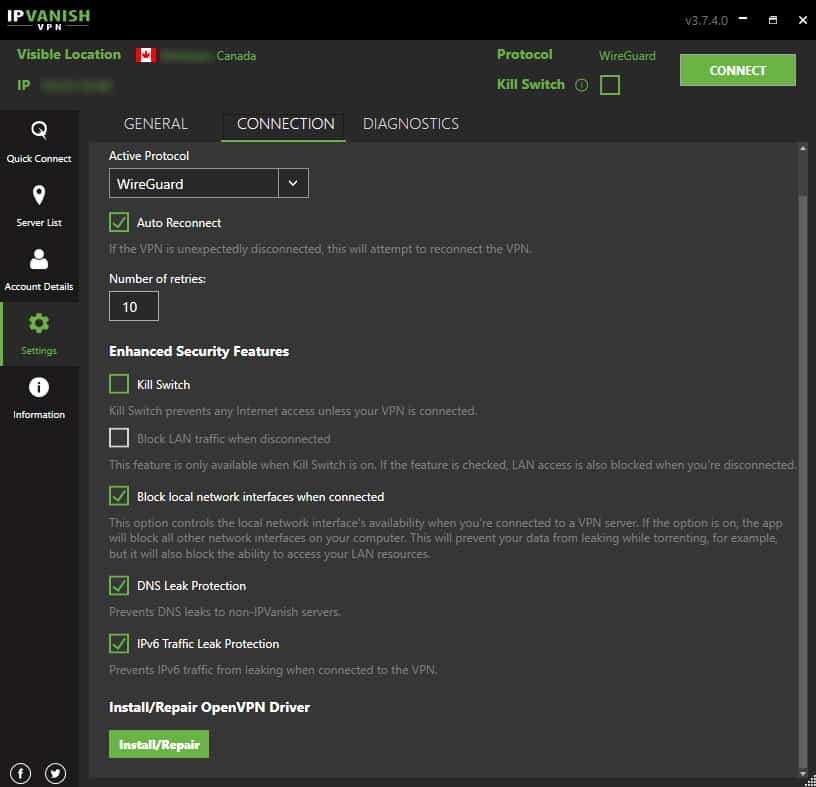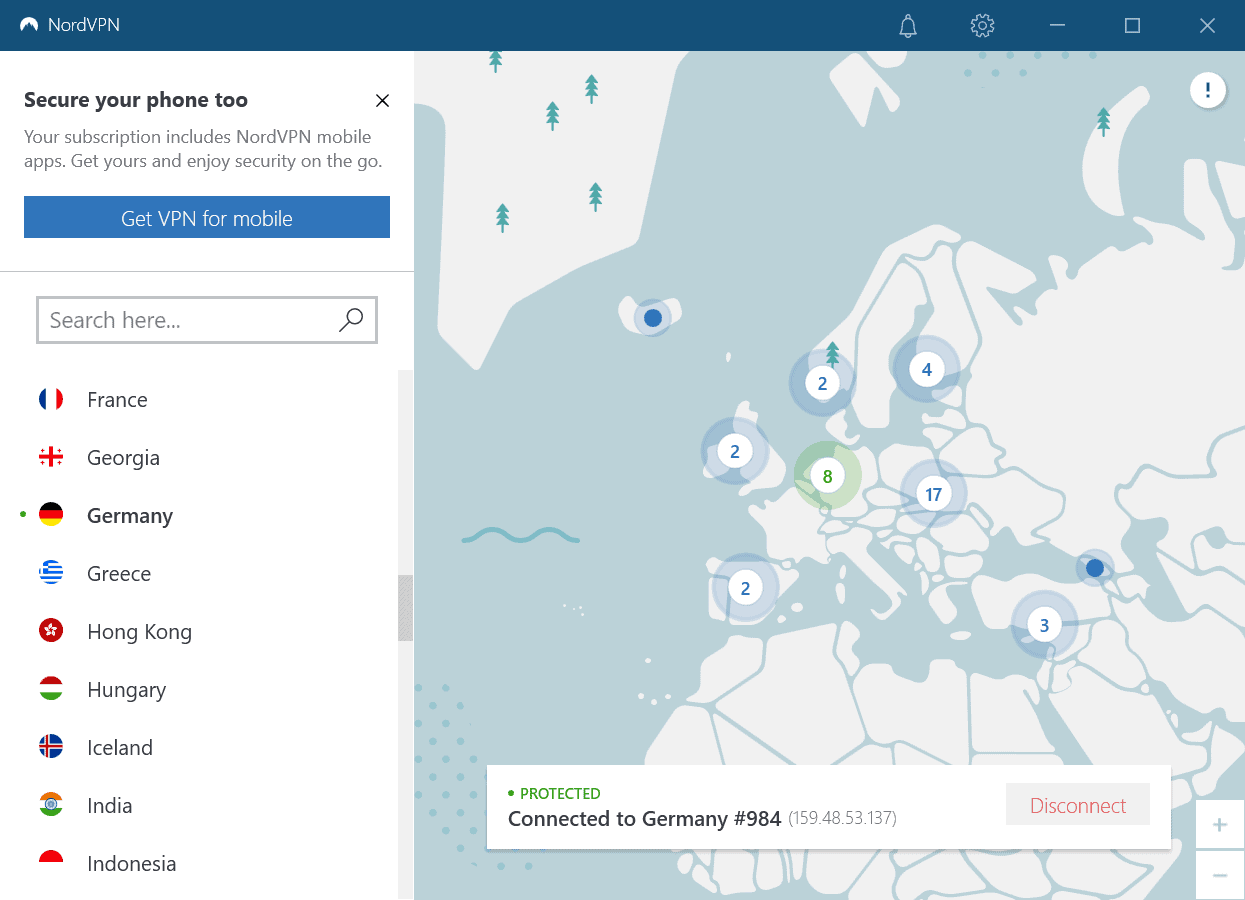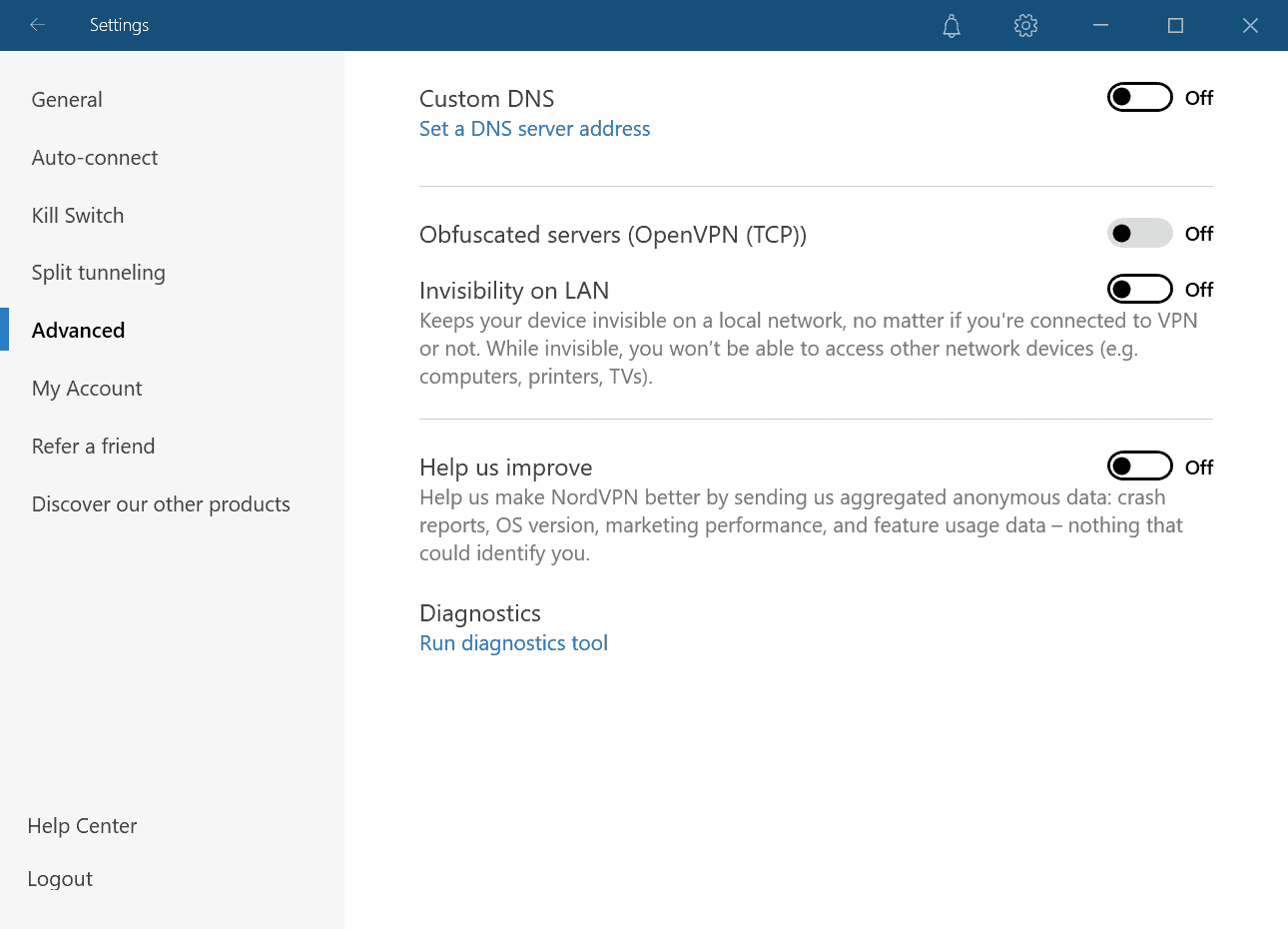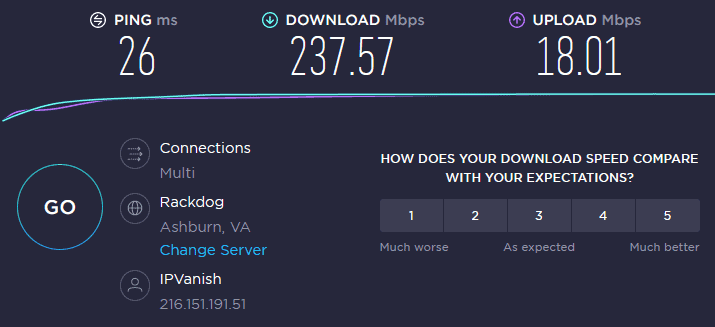IPVanish and NordVPN are two virtual private network (VPN) service providers, which we have reviewed here on this site recently. This comparison of the two providers may assist Internet users in selecting the right provider for their use cases. You may be astonished that the products differ in a lot of areas, including price, features and also privacy.
Here is what the comparison covers:
- Jurisdiction and privacy -- do the providers keep their privacy promises, e.g. that nothing is logged?
- Application and protocol support -- which apps are provided and which VPN protocols are supported?
- Features -- which VPN provider offers the better features?
- Media Streaming -- how good is the streaming support, e.g. can customers watch Netflix, Disney+ or Amazon Prime?
- Speed tests -- how good are the servers?
- Support -- which company has the best support options?
- Price -- which of the two providers offers the best value?
IPVanish vs. NordVPN at a glance
| IPVanish | NordVPN | |
|---|---|---|
| Jurisdiction | USA | Panama |
| Servers | More than 1900 servers in 75 locations | More than 5181 in 60 countries |
| VPN Apps | Windows Mac Linux Android iOS Router/other devices |
Windows Mac Linux Android iOS Router/other devices |
| Devices | Unlimited | 6 |
| Protocols | WireGuard IKEv2 OpenVPN L2TP/IPsec PPTP |
NordLynx (Wireguard) OpenVPN IKEv2/Ipsec L2TP/IPsec |
| Bandwidth | Unlimited | Unlimited |
| Logging | No* | No |
| P2P/Torrents | Yes | Yes |
| Streaming (unblock) | Limited | Yes |
| Features | OpenVPN Scrambling Killswitch |
CyberSec P2P Servers Obfuscated Servers Tor-over-VPN Double-VPN servers Killswitch Split Tunneling |
| Performance | Very Good | Very Good |
| Support | Email, chat support | Email, chat support |
| Privacy | No IP leaks No DNS leaks Killswitch works |
No IP leaks No DNS leaks Killswitch works |
| Price | $10.99 per month $4 per month for the first 2 years. $89.99 for each consecutive year |
$11.95 per month $4.92 for 12 months ($59 per year) $3.30 per month for 24 months ($89 per year) plus 3 extra months |
IPVanish vs. NordVPN jurisdiction
NordVPN is headquartered in Panama, which is not a member of the 14-Eyes countries.
IPVanish is headquartered in the United States. The company was acquired by J2 Global, which in the meantime split into the company's Ziff Davis and Consensus. Ziff Davis owns other VPN companies and file storing services, such as StrongVPN, Encrypt.me and Sugarsync, and also own popular media sources such as PCMag and Mashable, shopping and coupon site RetailMeNot, and finally gaming sites Humble Bundle and IGN, just to name some popular brands.
Panama is not a 14-eyes country. The United States is.
Winner: NordVPN
Server Comparison between NordVPN and IPVanish
NordVPN operates 5181 VPN servers in 60 countries. IPVanish operates more than 1900 servers in 75 locations. NordVPN's server fleet twice as large as the server fleet of IPVanish.
Most IPVanish servers are located in North America and Europe (almost 1800 servers). The provider operates 83 servers in Asia, 31 servers in South America, 11 in Africa, and 73 in Oceania. NordVPN does not list exact server numbers by region, but the company does operate servers on all continents as well.
IPVanish does not operate special servers, e.g. for streaming servers, P2P or obfuscation. NordVPN does offer some, including special servers for P2P and so-called Double-VPN servers which tunnel traffic through two VPN servers in different countries. NordVPN operates Onion over VPN servers, and supports obfuscated servers, which are designed for users from countries with high restrictions on the use of VPNs.
NordVPN controls its servers, which are co-hosted and run using RAM disks. It is unclear if IPVanish servers are rented, but it seems likely that this is the case.
Winner: NordVPN
VPN Apps supports

Both providers maintain applications for all major desktop and mobile operating systems. Clients are provider for the desktop operating systems Windows, Linux and Mac, and for the mobile operating systems Android and iOS. Instructions on setting up routers or connections manually are also provided on the websites.

The desktop applications enable customers to connect to a server quickly, or to select specific server locations. Both services display all supported protocols and extra options in the preferences. WireGuard is the default protocol but options are available to use a different protocol, which may be useful if WireGuard is not working properly.
The IPVanish client displays several security features in its interface under connection. You may enable the Kill Switch feature there, and enable the blocking of LAN traffic when the VPN disconnnects. Leak protections are enabled by default, as is the blocking of local network interfaces when connected to the VPN.
NordVPN lists several options that IPVanish does not support. Besides its content and malware blocking feature CyberSec, it is also supporting split tunneling, which enables customers to specify apps that should/should not use the VPN connection while connected to the VPN. Some apps, programs or sites may not work properly with VPNs.
IPVanish offers unlimited connections, while NordVPN restricts connections to 6 devices at the same time.
Winner: NordVPN's clients offer more features. Support for systems is equally good.
Encryption and Security: IPVanish vs NordVPN
IPVanish encrypts VPN traffic with an AES-256 cipher, 2048-bit key exchange and SHA-1 authentication. The service supports the protocols WireGuard, OpenVPN, IKEv2, L2TP and PPTP. The latter is considered insecure.
IPVanish does not reveal much about the technology that it uses for its server network. It describes the network as a Tier 1 network, but does not go into details. It is likely that servers are rented, and not operated by the company.
NordVPN encrypts traffic with an AES-256 cipher, a 4096 key exchange, and SHA256 authentication. These are stronger standards than those used by IPVanish. The company supports the protocols WireGuard (using its own implementation NordLynx), OpenVPN, IKEv2, and L2TP.
NordVPN is more open when it comes to its server network and the technology that it uses. Servers are run in RAM mode, which means that hard drives are not used and that there is no logging on the server. Additionally, NordVPN controls its server network using colocated servers that it owns. The claims have undergone an audit, which verified them.
Winner: NordVPN
IPVanish vs NordVPN logging
NordVPN's no-logging claim was verified by a third-party audit. IPVanish claims to be a no-logging provider as well, but the claim has not been verified by a third-party audit. Additionally, as Mike mentioned in his review, IPVanish had an incident in 2016, which caused doubt on the company's no-logging claim.
The previous owner of the company complied with a Department of Homeland Security request to provide information about a user, providing "numerous details that a company who claims not to log traffic would not have been able to provide". Nothing of this sort happened thereafter, but no third-party audit has confirmed the company's claims.
Winner: NordVPN
Streaming and P2P: IPVanish vs. NordVPN
Both providers support P2P traffic, but NordVPN operates special P2P servers that are optimized for the traffic. As far as streaming services support is concerned, both are not perfect. NordVPN supported more regional services during tests, e.g. more Netflix regions, and also other providers that IPVanish did not support at all, or not too well.
Mike's experience was not great:
Netflix and Amazon Prime were tested, and neither did very well. First, using a few Canadian IP addresses, both services detected the VPN. The same was when I started switching to American locations; I tried 10 different ones, two per state, and only one state and one server allowed me to access Netflix (I will not name the state or server however). So it should be noted that while the VPN has many many servers available, this could be a doubled edged sword; you may have to spend a long amount of time trying various servers out to get unblocked access to the streaming services that you want.
My NordVPN experience was better, but not perfect. Most servers worked to access services such as Netflix, BBC or Amazon Prime, but some were blocked, and some regional services could not be accessed at all. Mileage may depend on the server, as some may be blocked by streaming services.
Winner: NordVPN
IPVanish vs. NordVPN features

IPVanish offers the following features:
- Killswitch -- to block Internet connectivity if the VPN connection drops; this is a security precaution to avoid that the device's IP address leaks while the VPN connection is not available.
- OpenVPN Scrambling -- Deep-Packet Inspection is possible by ISP's and other agencies using advanced technologies; OpenVPN protocol with scrambling helps to protect against this and ensure privacy, including things such as the Great Firewall of China.
NordVPN has the following features:
- CyberSec – protects against known malicious sites and advertising by blocking these outright when enabled.
- Killswitch – blocks Internet traffic if the VPN connection drops. May also be used to terminate apps that you specify when the VPN connection is no longer available.
- Split Tunneling – Use some apps with a VPN connection and others without. Ideal for apps and services that block you if you are connected to a VPN.
- P2P servers – special servers optimized for torrent traffic.
- Obfuscated servers – designed to access the VPN service in countries that make VPN use difficult, e.g. China.
- Double-VPN servers – option to chain the connection so that it is routed through two VPN servers instead of just one.
- Tor-over-VPN – option to access Tor .onion sites using the VPN.
IPVanish's feature set is basic. The provider supports the WireGuard protocol, which is good. KillSwitch support is a must in these days, but many other providers, including NordVPN or Private Internet Access, have more to offer feature-wise.
NordVPN supports WireGuard as well, and it operates specialty servers for P2P or better protection online. Both providers lack specialized streaming servers though.
Both providers support leak protections and kill switches. NordVPN includes an application kill switch next to that, which terminates selected applications if the VPN connection is terminated.
Winner: NordVPN
IPVanish vs. NordVPN performance

IPVanish and NordVPN offered a good performance during tests. Mike, who reviewed IPVanish for the site, noted that IPVanish offered "very impressive speeds and very acceptable pings" when compared to the Internet connections raw performance. NordVPN offers excellent speeds and pings as well.
Connection performance depends on a lot of factors, including the user's Internet connection but also the selected VPN server. Mileage may vary, and it is a good idea to test performance by signing-up for a trial offer. All in all, both providers offered good performance values for the tested server connections.
Winner: Tie
IPVanish vs. NordVPN price comparison
IPVanish offers several different pricing options. A one month subscription is available for $10.99. Users who subscribe for a year or two pay $4 per month for the period. Afterwards, the price goes up to $89.99 per year, which comes down to 7.49 per month.
NordVPN's monthly price is higher, at $11.95. The 12 month subscription price is $4.92, and the 24 months subscription price is $3.30. The latter gets users 3 extra months on top. Pricing does not change after the periods.
IPVanish users may pay a bit extra ($0.89) to get 500 Gigabytes of secure cloud storage added to their account.
Most providers offer discounts every now and then. It is usually a good idea to wait until discounts become available to subscribe to one of the providers. The next discounts may be available during this year's Black Friday event.
Winner: NordVPN for the long run
Conclusion of our IPVanish vs. NordVPN comparison
NordVPN is the winner of the comparison. It offers more servers, better security and privacy, and is also better price-wise if you subscribe for two years. Additionally, NordVPN's claims and server network has been audited by an independent organization, which verified the company's claims.
Streaming support could be a bit better, especially when you compare it to CyberGhost, which operates servers for special streaming services.
IPVanish lacks many of the features of top of the class VPN providers. The service may still be an option for users, for instance when you can subscribe to it as a student or professor, as the price drops to $3.20 then. If you want to go online with a lot of devices at the same time, lot meaning more than six, then it is IPVanish that makes that possible.
Thank you for being a Ghacks reader. The post IPVanish vs. NordVPN Comparison: which VPN provider is better? appeared first on gHacks Technology News.
0 Commentaires